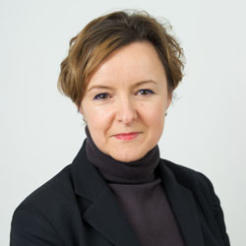The new chief executive of the Charity Commission has promised her organisation will be more proactive and do more to deter wrongdoing in the sector, and has said she plans to restructure the senior management to help achieve this.
Paula Sussex (pictured), who took over from previous chief executive Sam Younger at the end of June this year, was speaking at the Charity Commission’s Annual Public Meeting in one of her first public engagements as the organisation's chief executive.
She said: “In the many years of its existence the Charity Commission has been quite a reactive organisation and reliant on the sector reporting on itself and individual complaints. We are now gradually building up our capability to be more proactive and we are doing that because we want to prevent and to deter. We want to have more impact.”
She said the Commission is also embracing a more digital age.
In her closing remarks, Sussex said: “One of my goals is that I leave the Charity Commission with the skills and the talent of the organisation significantly enhanced, and that it is a sustainable organisation in the wider public sector. There is so much talent in the Commission that I think that an investment now into some of the skills will make it much stronger for the next 150 years.”
A spokeswoman from the Charity Commission said that the restructure of the senior management team is in process, but she could not reveal any more about what the wider implications would be.
William Shawcross, the chair of the Charity Commission, also spoke of this new “strategic direction”, which would involve more of a “firm regulatory approach”.
He said: “The key statutory duty of the Commission is to increase public confidence in the whole charity world. To promote public trust in charities we believe we must be seen to promote compliance by charity trustees with their legal obligations and we are trying to enhance the rigour of which we hold charities accountable.”
It was also revealed that despite the Commission's budget seeing a 50 per cent real term cut since 2007 the number of investigations has significantly increased.
The Commission's budget stands at £21.4m in 2013/14, yet the number of investigations has increased from 15 in 2012/13 to 64 so far in 2013/14.
There has also been a large increase in its use of legal powers as part of its "toughened approach during compliance work". There has been 540 uses of legal powers in investigative work in 2013/14, up from 216 in 2012/13.
‘Ludicrous criticism’
Shawcross also said that the Commission had received some "ludicrious criticism" following a National Audit Office report that was released at the end of last year, although he said many of the criticisms in the report itself were fair.
His objections centered on comments made by Margaret Hodge, the chair of the Parliamentary committee which scrutinises how the government spends its money, who said of the Commission that we should "throw a little quango on the bonfire”.
Shawcross said that a follow up report was currently being undertaken by the NAO. A spokeswoman from the Commission said that the NAO have been with them since August and will be carrying out site visits until October.
Following a question from the audience, Shawcross said he still supported the idea of charities paying towards the regulator, which he announced at a Charity Commission public meeting in July of this year. He said that this is something which will soon be discussed with charities.
Shawcross also warned charities which undertake aid work to be think carefully before travelling to areas such as Syria, following the execution of aid worker David Haines and threat on the life of a second aid worker, Alan Henning.
He said: “The murder of Haines and the terrible threat to Henning illustrate the very serious risks facing charities in some of the world's most dangerous places. People in these regions are in desperate need of the support that experienced registered charities can provide but these recent events have been a gruesome reminder of how crucial it is for charities to think very carefully before setting out to work in countries such as Syria.”









